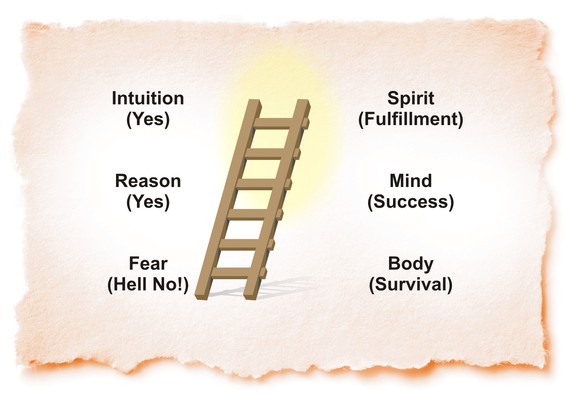"Faust complained about having two souls in his breast, but I harbor a whole crowd of them and they quarrel. It is like being in a republic." ~ Otto von Bismarck
The more we care about a goal, the harder it can be to commit to. And the more important a decision is, the harder it can be to make.
The problem is that big goals and big decisions automatically bring up our inner fears and conflicts. "Which choice should I make?" "What if I fail?" "What if someone better comes along?" And of course, the ever present "I'm not worthy!"
The first step to clarity is to recognize that the core conflict isn't between your different choices: it's between your different voices.
We all have different voices inside our heads. They're often in conflict. And when you learn how to resolve these conflicts, you're well on your way to getting more of what you most want in life.
"Multiple voices! What are you talking about?" I know, I know. In our culture, the idea of conflicting inner voices tends to bring up visions of straitjackets and rubber rooms. One of my favorite T-shirts reads, "Don't worry. 9 of the 10 voices in my head say DON'T shoot."
Relax. We're not talking about multiple personality disorder -- just healthy self-awareness.
In psychology, these different voices are called aspects or sub-personalities. Freud pointed out three big ones, which he called the id, the ego, and the super-ego. Jung added the collective unconscious to that list. Religious traditions have long taught the importance of listening to the voice of Spirit, also called the Holy Ghost. This is the proverbial "still, small voice."
So if it sometimes seems like there's a whole party going on inside your head, don't worry. You're not crazy. You're just waking up.
With training, most people can identify at least a dozen different sub-personalities, each of which is trying to serve them the best way it knows how.
In terms of making big decisions (and sometimes even small ones), the three most important voices to discern are the voice of fear, the voice of reason, and the voice of intuition.
The voice of fear comes from the body. It's a basic emotional fight or flight response that can be traced all the way back to the reptilian brain. Its job is to warn us of anything that might be dangerous or cause us pain. While fear-based responses often seem irrational, they're actually pre-rational. Fear precedes reason. Where fear has been around for hundreds of millions of years, comes out of the limbic brain, and exists even in lizards, reason is a relative newcomer to the party.
The voice of reason comes from the mind, specifically from the neocortex. It's not emotional. It's a capacity for rational thought that analyzes pros and cons and makes rational decisions.
The voice of intuition comes from spirit. Where the voice of fear is pre-rational and the voice of reason is rational, the voice of intuition is trans-rational. It exists beyond reason. That's why it seldom shows up in the form of thoughts or ideas. Instead, it acts more like a GPS device, helping us determine whether our choices are on course or not.
Where the voice of fear worries and the voice of reason analyzes, the voice of intuition resonates.
Intuition lights up around certain thoughts or decisions and not with others. It either offers a distinctly positive sensation or it goes thud. The voice of intuition shows up most commonly as a feeling of joy, excitement, purpose or inspiration. For me, something that's "on course" lights me up - it pulls my awareness up towards my head and fills me with a feeling of joy. Something that's "off course" feels disconnected - it pulls my awareness down towards my feet and leaves me feeling empty. Then there are many things that don't seem to matter to the voice of intuition - they don't resonate one way or the other.
When Jenny came to me for coaching, her goal was to create a million-dollar business. Jenny is charming, funny and brilliant, and I was excited to explore how I could help her make it happen. Yet as she shared her vision, she didn't seem jazzed by it. There was no spark in her. So we explored some questions. "What would you do if you knew you could not fail?" "If you had a magic lamp with three wishes, what would you wish for?" "If you were giving a speech at your own funeral forty years from now, what would you want to say about your life?" I kept poking at her, asking every question in my bag of tricks.
After almost an hour of this, something shifted. Jenny stopped, took a breath, and with a tear in her eye, shared the following. "I've never told this to anyone else. I don't know if I've even admitted it to myself. What I really want is to be married and have a family. But I've given up believing that's possible for me."
That breakthrough made all the difference. In owning her truth, Jenny was able to start facing her fears, addressing her blocks, and claiming her dreams. She lost 40 pounds, reconnected with her birth mother, started acting in her local theatre, and began dating some wonderful men. She's transformed her self-confidence, built a community of close friends, and is now well on her way to creating a family of her own. All this happened because she was able to resolve this conflict between her inner voices and recognize that while her truth was saying "Yes Yes," her fear was saying "Hell No!"
The Yes Yes Hell No! tool empowers you to make big decisions and create big wins. It also serves a third purpose of releasing the fears that have been holding you back. When you're able to embrace the voice of fear, let it speak as itself, and genuinely listen to its warnings, a profound inner shift occurs. The voice of fear shifts from being an enemy to an ally, all those unconscious blocks and insecurities begin to fall away, and you're able to start taking action on your big decisions and big wins in much easier, more powerful, more graceful ways. The key is being able to discern which voice is which and to allow each voice to speak as itself.
When Jenny shared about her business goals, my voice of intuition didn't light up at all. Her words fell flat -- that thud I mentioned earlier -- and left me with a slight feeling of disconnection. I just didn't get any sense that creating a big company was what she really cared about the most. So I kept asking questions until we got to what truly had energy for her - her desire to be married and have a family. When that happened, my intuition lit up as did hers, and we knew we were getting to something that really mattered to her.
Of the three voices, the voice of intuition is the surest guide to your highest good. It's the best advocate for your enlightened self-interest. It's a compass needle pointing directly toward your greatest joy. The voice of intuition is always present, yet it can also be the most difficult voice to hear and the hardest voice to trust.
Thankfully, the voice of fear is easy to notice. It's rarely far away. It's loud and vocal.
And it's extremely accurate -- once you understand the language it speaks.
This article was created as an excerpt from Yes Yes Hell No! The Little Book for Making Big Decisions. To eliminate your insecurities, transform your fears, and develop total trust in your ability to make big decisions, purchase the book on Amazon or download the first five chapters for free. Image source: pixabay.com

